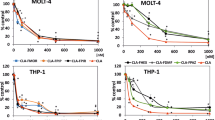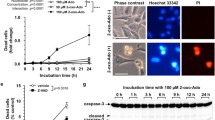Abstract
Among several nucleosides, adenosine is the only one to induce typical apoptotic cell death in human promyelocytic leukemia HL-60 cells. Intracellularly transported adenosine seemed to be required for the induction of apoptosis, since dipyridamole, which inhibits the transport of adenosine, strongly suppressed apoptosis, and 8-phenyltheophylline, a receptor antagonist, did not affect the adenosine-induced effect. The viability of adenosine-treated HL-60 cells was partially recovered by supplementation with a pyrimidine nucleoside, uridine or thymidine. Cytidine or deoxycytidine had no effect on the growth and survival of adenosine-treated cells, while uridine or thymidine inhibited adenosine-induced intracellular DNA fragmentation. These results suggest that the quantitative adjustment of purine and pyrimidine nucleosides might play an important role in the adenosine-induced apoptosis of HL-60 cells. The reduction of c-Myc expression in adenosine-treated cells was prevented by uridine or thymidine. These observations suggest that the expression of c-Myc might be related to an intracellular sensing system for the quantitative balance of nucleosides or nucleotides.
Similar content being viewed by others
Author information
Authors and Affiliations
Additional information
Received: 14 January 1998 / Accepted: 11 May 1998
Rights and permissions
About this article
Cite this article
Kim, K., Yeo, Ej., Choi, H. et al. The effect of pyrimidine nucleosides on adenosine-induced apoptosis in HL-60 cells. J Cancer Res Clin Oncol 124, 471–477 (1998). https://doi.org/10.1007/s004320050201
Issue Date:
DOI: https://doi.org/10.1007/s004320050201




